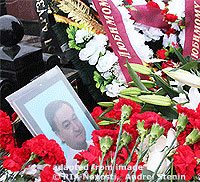Russian Lawmakers Warn of Retaliation Over Magnitsky List
RIA Novosti - 7.13.12 - JRL 2012-127
MOSCOW, July 13 (RIA Novosti) Russia is ready to take adequate measures in response to the so-called Magnitsky Act if it is adopted by the United States, a Russian senator said on Friday commenting on the results of his recent meetings with U.S. lawmakers.

The Magnitsky Rule of Law Accountability Act with amendments seeks to impose visa bans and asset freezes on Russian officials allegedly involved in the torture and death of a 37-year-old Russian anti-corruption lawyer, Sergei Magnitsky, as well as in other gross human rights abuses in Russia.
A group of Russian senators recently visited the United States and presented previously unpublished documents to their U.S. counterparts which they claim prove the involvement of the late lawyer Sergei Magnitsky in tax fraud.
"At our meeting with Under Secretary of State for political affairs Wendy Sherman, she said Washington hopes that Russia will not take retaliatory approach to the Magnitsky Act, but she is deeply mistaken," said Valery Shnyakin, deputy chair of the Federation Council's Committee for International Affairs .
"Those will be countermeasures that would let the Americans feel the strength and power of Russia's political clout," he said, adding that the measures would not necessarily include similar visa bans and asset freezes for U.S. officials.
The Magnitsky bill has so far been cleared by foreign relations committees in both the House of Representatives and the Senate.
However, the U.S. National Foreign Trade Council (NFTC) has urged Congress to oppose the legislation as it would most likely hurt Russia - U.S. trade and badly damage ties.
The bill has to be passed by the Congress and signed by the U.S. president to come into force.
Magnitsky was arrested on tax evasion charges in November 2008, just days after accusing police investigators in a $230-million tax refund fraud, and died after almost a year in the Matrosskaya Tishina pre-trial detention center in Moscow.
A probe into his death revealed that the lawyer, who was suffering from untreated pancreatitis and a heart condition, did not receive proper medical treatment. Rights activists pointed to multiple violations of the lawyer's rights during his arrest and detention, including signs that he was beaten by prison guards hours before his death.
The U.S. State Department issued visa bans on several dozen Russian officials in connection to the Magnitsky case in July 2011. In response, Russia has imposed travel bans on several U.S. officials.
The Magnitsky case, along with the Jackson-Vanik amendment and the rift over the Syrian crisis, are major stumbling blocks in the "reset" of U.S.-Russian relations.
Keywords: Russia, Assassinations, Beatings, Prison Deaths - Russian News - Russia
MOSCOW, July 13 (RIA Novosti) Russia is ready to take adequate measures in response to the so-called Magnitsky Act if it is adopted by the United States, a Russian senator said on Friday commenting on the results of his recent meetings with U.S. lawmakers.

The Magnitsky Rule of Law Accountability Act with amendments seeks to impose visa bans and asset freezes on Russian officials allegedly involved in the torture and death of a 37-year-old Russian anti-corruption lawyer, Sergei Magnitsky, as well as in other gross human rights abuses in Russia.
A group of Russian senators recently visited the United States and presented previously unpublished documents to their U.S. counterparts which they claim prove the involvement of the late lawyer Sergei Magnitsky in tax fraud.
"At our meeting with Under Secretary of State for political affairs Wendy Sherman, she said Washington hopes that Russia will not take retaliatory approach to the Magnitsky Act, but she is deeply mistaken," said Valery Shnyakin, deputy chair of the Federation Council's Committee for International Affairs .
"Those will be countermeasures that would let the Americans feel the strength and power of Russia's political clout," he said, adding that the measures would not necessarily include similar visa bans and asset freezes for U.S. officials.
The Magnitsky bill has so far been cleared by foreign relations committees in both the House of Representatives and the Senate.
However, the U.S. National Foreign Trade Council (NFTC) has urged Congress to oppose the legislation as it would most likely hurt Russia - U.S. trade and badly damage ties.
The bill has to be passed by the Congress and signed by the U.S. president to come into force.
Magnitsky was arrested on tax evasion charges in November 2008, just days after accusing police investigators in a $230-million tax refund fraud, and died after almost a year in the Matrosskaya Tishina pre-trial detention center in Moscow.
A probe into his death revealed that the lawyer, who was suffering from untreated pancreatitis and a heart condition, did not receive proper medical treatment. Rights activists pointed to multiple violations of the lawyer's rights during his arrest and detention, including signs that he was beaten by prison guards hours before his death.
The U.S. State Department issued visa bans on several dozen Russian officials in connection to the Magnitsky case in July 2011. In response, Russia has imposed travel bans on several U.S. officials.
The Magnitsky case, along with the Jackson-Vanik amendment and the rift over the Syrian crisis, are major stumbling blocks in the "reset" of U.S.-Russian relations.